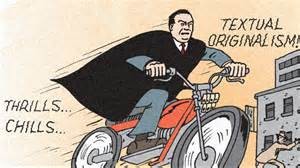
What is the basis of Jewish law? This is not a trick question. The safest answer, surely, is the Torah.
 And we here are using Torah as a synonym for the word of God, as found in Tanakh, the holy scriptures. But if you ask what is the definitive code of Jewish law, the best answer is not the Torah, but the Talmud. The Talmud is divided into two main parts, the Mishnah and the Gemara, both written centuries after the final canonization of Tanakh. The Mishnah is remarkably self-contained. It is a discussion of law by sages, providing various opinions, along with some indication of what was the consensus view among them. But the Mishnah devotes almost no space to explaining how the sages reached their conclusions—it just states opinions, not explanations. The Gemara, written several hundred years later is more expansive, with more discussion of the law, exploration of hypothetical cases, and some attempt to provide justifications for rabbinic rulings, usually in the form of prooftexts, citations to biblical verses that appear to bolster the case for the point under discussion.
And we here are using Torah as a synonym for the word of God, as found in Tanakh, the holy scriptures. But if you ask what is the definitive code of Jewish law, the best answer is not the Torah, but the Talmud. The Talmud is divided into two main parts, the Mishnah and the Gemara, both written centuries after the final canonization of Tanakh. The Mishnah is remarkably self-contained. It is a discussion of law by sages, providing various opinions, along with some indication of what was the consensus view among them. But the Mishnah devotes almost no space to explaining how the sages reached their conclusions—it just states opinions, not explanations. The Gemara, written several hundred years later is more expansive, with more discussion of the law, exploration of hypothetical cases, and some attempt to provide justifications for rabbinic rulings, usually in the form of prooftexts, citations to biblical verses that appear to bolster the case for the point under discussion.
But how do you interpret the Bible? The language is usually terse, and rarely explains itself. And often, the language is vague—“you shall not kill,” for instance, requires a detailed discussion of what killing is—does it apply to animals, to warfare, to self-defense, etc. And there are elaborate methods the rabbis developed for interpreting Tanakh. In classic rabbinic Judaism, there are four main methods of biblical interpretation, peshat, the literal meaning; remez, the meaning alluded to in the verse; drush, the deeper meaning, not obvious at first; and sod, the secret, hidden meaning, not obvious at all. Armed with these four tools of interpretation, it is safe to say, the rabbis could wring out of any verse any meaning they wanted.
For some this is just conceding the victory to arrant subjectivity. There has to be one way, and only one, of interpreting a given text, and everyone has to agree on the method of interpretation. Otherwise, one faces an interpretive free for all. And I really haven’t been writing about Jewish law at all. The hidden meaning in what I have just written is that I have been discussing the interpretation of the US Constitution.
As we know, Antonin Scalia, longtime justice of the US Supreme Court, died last week, bequeathing us both a political donnybrook and his legacy as a justice. Personally, I think many tributes have been too kind to Scalia, and exaggerate the importance of his jurisprudence, which I think will prove less influential than many pundits predict. Acknowledging, as one must, his intellectual brilliance, quick wit, and pungent prose style, he was also a conservative blowhard, world-class bully, and often nakedly partisan in his rulings. But he is probably best remembered for his philosophy of jurisprudence known as originalism. To summarize quickly, it basically holds that judges should interpret the Constitution and statutory law from the common meaning the words had at the time they were passed. For Scalia this largely was a rule on how not to interpret the Constitution; don’t use the legislative history of the act in question, pay little attention to how other courts have interpreted the words of the act, and do not assume that judges can expand the meaning of the words to deal with exigencies the original act did not anticipate. Scalia tried to drive a stake through the heart of the so-called “living constitution,” the notion that the constitution evolves over time to meet with new challenges. He was not notably consistent in applying his understanding of originalism—he completely ignored the bit about “a well-regulated militia” in his interpretation of the 2nd amendment, but complete consistency is perhaps too high a standard for any judge. The question of Scalia’s legacy in large part rests on the question of the significance of his understanding of originalism.
What would the writers of Mishnah and Gemara make of Scalia’s notion of originalism, as applied to Tanakh? For starters, of course, they would have rejected any notion that the original meaning of the words could be divined through trying to determine what they meant at the time they were written. The word of God does not change over time. But the rabbis knew also that the words of God were never self-interpreting. (Even if God says, “x, and this is what I mean by x” the rabbis would ask, “what does it mean when God says ‘this is what I mean by x?’” ) And they certainly wouldn’t have understood the objection that you have to choose between fixed meanings and a “living” legal system. And they would have rejected Scalia’s argument that there is only one way, and one right way only, to interpret a legal text.
The rabbis would have seen Scalia’s originalism for what it is; an effort to cut off and stifle debate. It is one thing to say, in a legal discussion, “I believe I have the better argument, and here’s why” and quite another to say, as Scalia often did “I have the better argument, and your argument is not only wrong, but you have no right to make the argument at all, so please shut up.” And this is the ultimate paradox about Scalia’s originalism–intended to eliminate subjectivity from judging, it only inflames the arguments, and make all positions seem more partisan and biased. The Talmud always operates from the position of ‘”unoriginalism”—what is most important is that you can claim to be part of a chain of interpretation, of tradition, and that you recognize yourself as part of that chain.
The Talmud had it right; the most important part of the law is the discussion, and you need to have enough trust in the participants to be able to, when necessary, “agree to disagree” and still remain in the dialogue. There is no way to completely eliminate subjectivity from judging and reaching a decision. All cases are different, all judges are different, and we need to be willing to recognize this.
But though circumstances always change, legal codes sometimes do not. In Israel, the orthodox rabbinate use Jewish law not as a way of engaging in dialogue, but in shutting out those they do not want to listen to. And in the United States, Scalia and those of his ilk likewise think the time for engaging in dialogue, about the law or any other subject, is for the weak minded. Because if there is one lesson to be drawn from Scalia’s life and legacy, it is that if you think you are always right, you are always wrong.